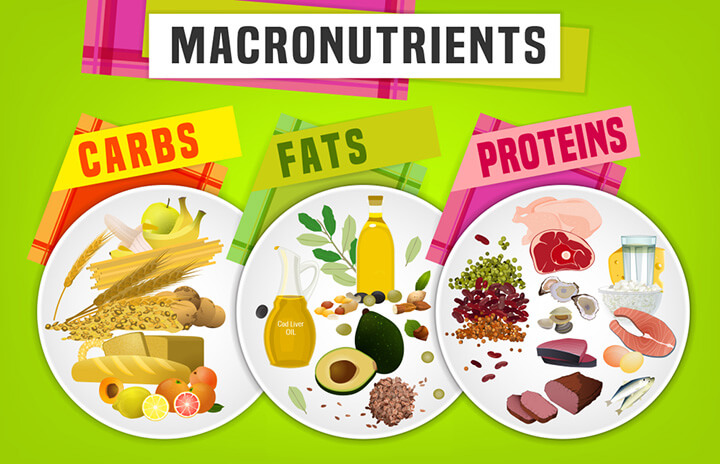We see the term “macronutrients" everywhere, but have you asked yourself questions: “What are macronutrients?”, “Are they important?”, “And which ratio is the best for you?”
What Are Macronutrients?
Macronutrients, or macros for short, are nutrients needed in large amounts. For your information, nutrients are environmental substances used for energy and bodily functions.
Macronutrients are composed of three familiar nutrition groups: protein, carbohydrates and fat. When these elements meet, they will provide calories for the body, which promotes your energy and makes you feel powerful.

As a certain role for the body, each macronutrient is an indispensable ingredient in daily meals. You can see the calories contained in these nutrition groups as below:
- Carbohydrates: 1g = 4 calories
- Proteins: 1g = 4 calories
- Fat: 1g = 9 calories
For example, when a food label includes 5g of carbohydrates, 5g of protein and 0g of fat, it means that the product contains 40 calories. Or, with an apple having 95% of carbs, 2% of protein and 3% of fat, it is classified as a carb food.
Now, let's find out more about carbohydrates, protein and several types of fat!
What Are Carbohydrates?
Carbohydrates include starches, sugars and fiber. As a material source for your body and brain, carbohydrates keep your mind awake and boost your strength.
Studies have shown, an adult should get 45-65% of calories coming from carbohydrates. Carbohydrates are divided into 2 types:
- Complex carbohydrates(slow-absorbing carbs), found in oats, barley, brown rice, and brown bread, etc. These are high-fiber starches. That fiber will prevent cravings, which makes you eat less.
- Simple carbs (fast-absorbing carbs), found in white starches such as rice, fresh bread, pho, or in all kinds of candies, cakes. Rapidly absorbed carbs will push your digestion. Your hunger can come soon, you may ask for more food while old calories have not been burned.
Do you know fiber is a form of non-energy carbs found in many fruits, vegetables and nuts? So, you might want to take a look at some good carbs sources such as:
- Whole grains
- Starchy vegetables like sweet potatoes, beets, etc.
- Kinds of bean
- Fruits like apples, pears, bananas, etc.
What is Protein?
During digestion, proteins are broken down into small chains. In those chains, polypeptides accompany other individual units called absorbing amino acids. To make up proteins, there are 22 amino acids and 9 of them are essential. The reason is that your body cannot generate these amino acids itself.
Protein is the building block of cellular and muscle structures. In addition, protein supports your immune system, maintains and develops the formation of your hair, nails, and skin. According to some research, protein should make up 10-35% of adult calories. The amount of protein per day should depend on the bodyweight of each person, at least 0.8g/ kg/ day. For instance, an 18-year-old girl with a weight of 45 kg will require 36g of protein. For athletes in training seasons, those who lift weights will need 1.3-1.8g/ kg/ day.
What About Fat?
Don’t misunderstand that fat will make you gain weight. Like carbohydrates and protein, fat plays an important role as it is a rich source of energy for the body and helps metabolize vitamins A, D, E and K.
There are 3 types of fat:
- Saturated fat: found a lot in animal fat, cheese, whole milk, etc. Animal fat provides your body with the amount of cholesterol involved in hormone production such as testosterone. However, when high cholesterol levels lead to cardiovascular disease, the circulation of blood vessels will be blocked by fats that do not dissolve in the blood. As a result, they will close up the artery walls.
- Unsaturated fat: In contrast to saturated fat, unsaturated fat is considered good fat. It lowers the amount of bad cholesterol in the blood and increases blood circulation. In addition, unsaturated fats help regulate metabolism, which is important in cell growth and regeneration. Unsaturated fat can be found in plants, such as nourishing seeds and fish.
- Trans fat: This kind of fat is extremely bad for your body. Trans fat is found in fast foods and is responsible for high cholesterol, as well as cardiovascular disease pathogens.
It has been said that 20-35% of daily calories should come from fat. Hence, you can choose some sources of unsaturated fat to prevent diseases and not be afraid of gaining weight such as:
- Avocado and avocado oil.
- Olive and olive oil.
- Plant-based nutrients such as cashews, walnuts,
- Types of fish, especially salmon.
The Macro Diet
To calculate the macros needed per day, here is the calorie calculation in your healthy diet.

The Macro Diet will help you stay in great shape with a good weight. Let me give you a simple example to help you understand!
For instance, I am 26 year old, 160cm tall and weigh 50kg. So according to Harric Benedict's formula: BMR = 655 + (9.6 x 50) + (1.8 x 160) - (4.7 x 26) = 1300.8.
With this basic metabolic rate, I can determine the amount of calories needed in a day by multiplying BMR with 1.375 (1.375 is the index for those who have light physical activities, from 1-3 times per week). To be specific, my total daily energy expenditure (TDEE) = 1300.8 × 1.375 = 1788.6.
So I need 1788 calories per day. With 1788 calories, I follow the standard diet with 40% carbs, 30% protein and 30% fat.
- Carbs (1g = 4 calories) so 40% carbs of 1788 calories will be 715.2 calories/ day.
That means my daily allowance of carbs is: 715.2 / 4 = 178.8 grams.
Carbs (gram) = (TDEE x 40%) / 4
- Protein (1g = 4 calories) so 30% protein of 1788 calories will be 536.4 calories/ day.
That means my total amount of protein per day is: 536.4 / 4 = 134.1 grams.
Protein (gram) = (TDEE x 30%) / 4
- Fat (1g = 9 calories) so 30% fat of 1788 calories will be 536.4 calories/ day.
That means my total daily fat allowance is: 536.4 / 9 = 59.6 grams.
Fat (gram) = (TDEE x 30%) / 9
⇨ So my daily calorie intake would be: 178.8 grams of carbs, 134.1 grams of protein and 59.6 grams of fat.
Macronutrient Ratio Helps You Decide What To Eat
According to nutritionist Sarah Wilkins, the percentage of macros you need to gain muscle and lose fat is 30-40-30, which is 30% of calories from carbohydrates, 40% of calories from protein and 30% of calories from fat...
After calculating TDEE, you can evaluate your calories depending on how much energy you should have per day. Here are some macronutrient rates you should know to increase muscle and lose weight.
|
Calories |
Carbohydrates (30%) |
Protein (40%) |
Fat (30%) |
|
1200 kcal |
90g |
120g |
40g |
|
1500 kcal |
112.5g |
150g |
50g |
|
2000 kcal |
150g |
200g |
66g |
Macronutrient Ratio Suitable To Nutrition Regimen
Macro Diet That Helps Weight Loss
If you want to lose weight, give this macronutrient ratio a try! Make sure you calculate the amount of macros the same way as you cut calories in your body. To have the best result, follow this diet and exercise frequently.
- Carbs: 10-30% of calories.
- Protein: 40-50% of calories.
- Fat: 30-40% of calories.
Macro Diet That Maintains Your Weights
Balance your weight with this recommended macro ratio.
- Carbs: 30-50% of calories.
- Protein: 25-35% of calories.
- Fat: 25-35% of calories.
Macro Diet With Keto Mode On
This is a diet in which you consume plenty of fat, enough protein and fewer carbs. It can be seen clearly through this macro ratio.
- Carbs: 5-10% of calories.
- Protein: 15-30% of calories.
- Fat: 60-75% of calories.
Low-carb Macro Diet
Low-carb or Low-carbohydrates Macro Diet reduces the amount of carbohydrates and sugar in your daily meals.
- Carbs content: 30-40% of calories.
- Protein content: 20-30% of calories.
- Fat content: 30-40% of calories.
Through this article, we have learned of macronutrients and how to calculate them. Although taking macronutrients, vitamins and minerals are really crucial, don't forget to balance them, too. Enough is the best. Only doing that will make you have a healthy body and a relaxed mind.
Related Articles:










